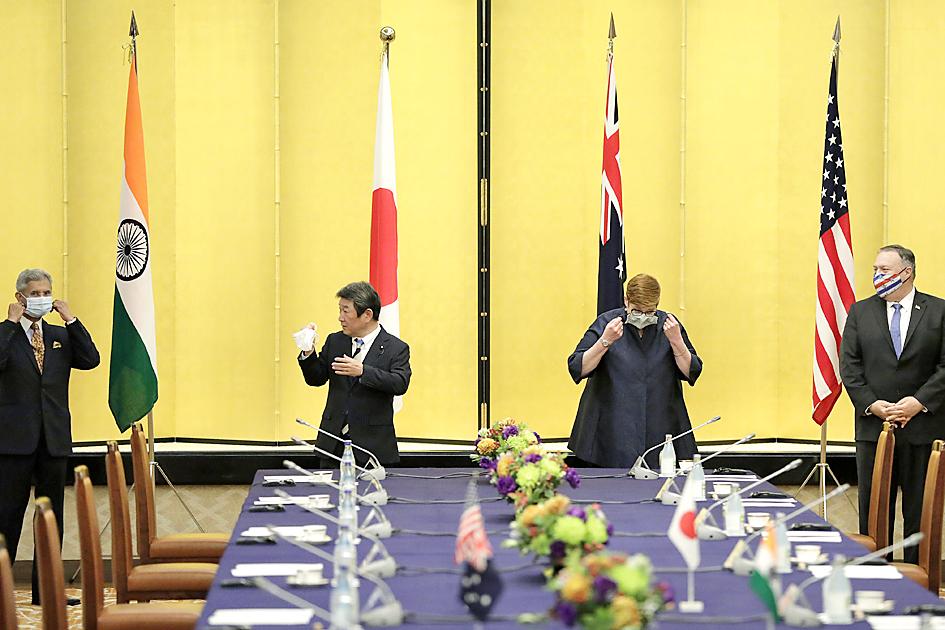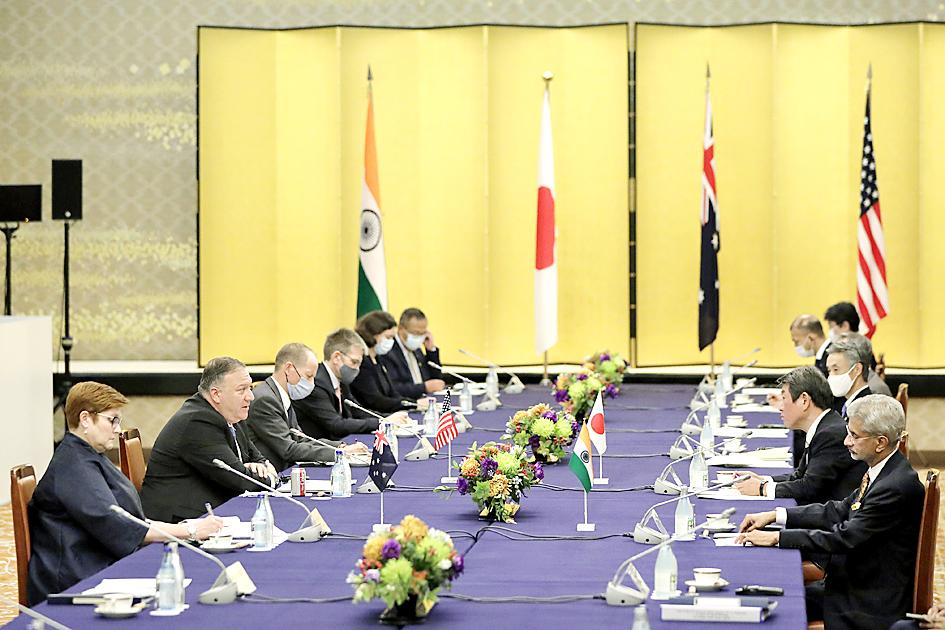US Secretary of State Mike Pompeo yesterday said that China’s increasingly assertive actions across the region make it more critical then ever for the four Indo-Pacific nations known as the Quad to cooperate to protect their partners and their people from Chinese “exploitation, corruption and coercion.”
Pompeo made the remark at a meeting in Tokyo with the foreign ministers of Japan, India and Australia, who together make up the Quadrilateral Security Dialogue. The talks were the group’s first in-person since the COVID-19 pandemic began.
Pompeo accused China of covering up the pandemic and worsening it, while threatening freedom, democracy and diversity in the region with its increasingly assertive actions.

Photo: EPA-EFE
“It is more critical now than ever that we collaborate to protect our people and partners from the Chinese Communist Party’s exploitation, corruption and coercion,” he said. “We see in the East and South China seas, the Mekong, the Himalayas, the Taiwan Strait.”
Earlier in the day, Japanese Prime Minister Yoshihide Suga said at a meeting with the Quad diplomats — Pompeo, Australian Minister of Foreign Affairs Marise Payne, Indian Minister of External Affairs Subrahmanyam Jaishankar and Japanese Minister of Foreign Affairs Toshimitsu Motegi — that their “Free and Open Indo-Pacific” (FOIP) security and economic initiative is more important than ever amid challenges from the pandemic.
The international community faces multiple challenges as it tries to resolve the pandemic, and “this is exactly why right now it is time that we should further deepen coordination with as many countries as possible that share our vision,” Suga said.

Photo: EPA-EFE
Japan and the US have been pushing the FOIP as a way to bring together “like-minded” countries that share concerns about China’s growing assertiveness and influence.
Pompeo met earlier one-on-one with his counterparts, meetings in which, according to the US Department of State, he shared their concerns about China’s increasing influence in the region, while reaffirming the importance of cooperation among those sharing the concerns.
Japan hopes to regularize the Quad foreign ministers’ talks and broaden their cooperation with other countries.

INVESTIGATION: The case is the latest instance of a DPP figure being implicated in an espionage network accused of allegedly leaking information to Chinese intelligence Democratic Progressive Party (DPP) member Ho Jen-chieh (何仁傑) was detained and held incommunicado yesterday on suspicion of spying for China during his tenure as assistant to then-minister of foreign affairs Joseph Wu (吳釗燮). The Taipei District Prosecutors’ Office said Ho was implicated during its investigation into alleged spying activities by former Presidential Office consultant Wu Shang-yu (吳尚雨). Prosecutors said there is reason to believe Ho breached the National Security Act (國家安全法) by leaking classified Ministry of Foreign Affairs information to Chinese intelligence. Following interrogation, prosecutors petitioned the Taipei District Court to detain Ho, citing concerns over potential collusion or tampering of evidence. The

‘FORM OF PROTEST’: The German Institute Taipei said it was ‘shocked’ to see Nazi symbolism used in connection with political aims as it condemned the incident Sung Chien-liang (宋建樑), who led efforts to recall Democratic Progressive Party (DPP) Legislator Lee Kun-cheng (李坤城), was released on bail of NT$80,000 yesterday amid an outcry over a Nazi armband he wore to questioning the night before. Sung arrived at the New Taipei City District Prosecutors’ Office for questioning in a recall petition forgery case on Tuesday night wearing a red armband bearing a swastika, carrying a copy of Adolf Hitler’s Mein Kampf and giving a Nazi salute. Sung left the building at 1:15am without the armband and apparently covering the book with a coat. This is a serious international scandal and Chinese

Seventy percent of middle and elementary schools now conduct English classes entirely in English, the Ministry of Education said, as it encourages schools nationwide to adopt this practice Minister of Education (MOE) Cheng Ying-yao (鄭英耀) is scheduled to present a report on the government’s bilingual education policy to the Legislative Yuan’s Education and Culture Committee today. The report would outline strategies aimed at expanding access to education, reducing regional disparities and improving talent cultivation. Implementation of bilingual education policies has varied across local governments, occasionally drawing public criticism. For example, some schools have required teachers of non-English subjects to pass English proficiency

TRADE: The premier pledged safeguards on ‘Made in Taiwan’ labeling, anti-dumping measures and stricter export controls to strengthen its position in trade talks Products labeled “made in Taiwan” must be genuinely made in Taiwan, Premier Cho Jung-tai (卓榮泰) said yesterday, vowing to enforce strict safeguards against “origin laundering” and initiate anti-dumping investigations to prevent China dumping its products in Taiwan. Cho made the remarks in a discussion session with representatives from industries in Kaohsiung. In response to the US government’s recent announcement of “reciprocal” tariffs on its trading partners, President William Lai (賴清德) and Cho last week began a series of consultations with industry leaders nationwide to gather feedback and address concerns. Taiwanese and US officials held a videoconference on Friday evening to discuss the